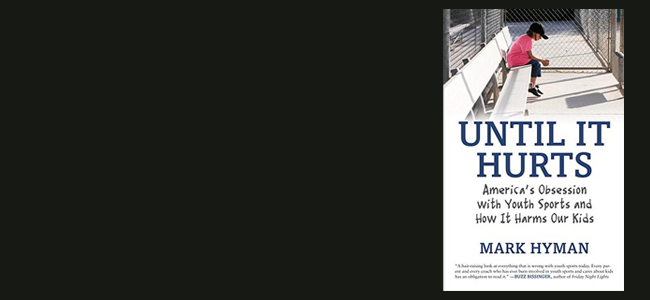 Mark Hyman is a journalist and an author. One of his recent books is entitled: Until it Hurts — America’s Obssesion With Youth Sports and How it Harms Our Kids. I recommend it. You can read more about the book and where to purchase it here.
Mark Hyman is a journalist and an author. One of his recent books is entitled: Until it Hurts — America’s Obssesion With Youth Sports and How it Harms Our Kids. I recommend it. You can read more about the book and where to purchase it here.
But the reason for my post has less to do with what Mark wrote and more to do with what he said in discussing his book below in the video clip. We have talked about trusisms in youth sports before.
The first truism we discussed was this one: You may or may not get what you want, but you will almost always get what you deserve. You can find that one discussed here.
Today’s truism in youth sports is the title to this post: You are either part of the problem or part of the solution: Pick a side because there is no middle ground. I learned about this truism years ago but in a different context than Mark.
Like I said about the first truism, I expect we will also return to this time and time again over the next few months.
Mark discovered this truism through his son’s baseball experience:
Mark discovered that what he was writing and doing in his own life were two different things. He had to face the fact that he was either part of the problem or part of the solution. Until it Hurts reflects his effort to be part of the solution.
Until it Hurts details many individual stories about the excesses in youth sports for parents and their children. But the truism has broader applications.
Let’s look at a league-wide application of this truism to volunteer youth sports organizations.
I’m reminded of the story of the parent who kept complaining about the condition of a pitcher’s mound to a league official. His son was a pitcher and thought the mound was too sandy. He had a point. The mound needed some work. The clay base had worn out due to so much use during the season. The league official agreed to buy the materials if the parent would agree to lead a crew to improve the mound. The parent balked and said he did not have the ability to do such a task. The league official assured him that he would give him instructions on how to do it. The parent then said he did not have the time.
Leagues, like this one, are often strapped for volunteers and resources. The mound had issues.The solution was to fix it.The problem was that the league needed volunteers to do it.The parent refused and kept complaining.Whether the parent knew it or not, he chose to be part of the problem.
Here’s another example. I remember the story of a parent who complained about the selection of all-stars to league officials. He was invited to serve on the board. Meeting after meeting, all he did was complain. He had some points. He was asked to draft new procedures for the selection of all-stars to address all of his concerns. He said he would try but he quit the board before doing anything.Yet he continued to complain during the season.The complaining parent had become part of the problem, not part of the solution.
Community programs depend on volunteers. If you have complaints about how things are done, then find a way to help fix them with your participation. Otherwise, you may unknowingly be part of the problem in that there are not enough willing or capable volunteers available to have things run smoothly as you would like.
Remember, complaining to a volunteer organization is not like complaining to a business. A business does not expect you to help fix its problems. A smart volunteer program will look for you to help and may even ask you to be in charge of the item you’re complaining about.
To be fair, there are times that people volunteer only to be told that their help is not needed or wanted. That could be sign of a closed organization. If that is the case, then the league officials might well be a problem.
You can use this truism in conjunction with the first one as a handy framework to look at problems in youth sports. They will help clarify things for you and the members of your organization. They will steer you towards solutions and away from endless, circular complaining sessions.
What are your thoughts? Have you had any experiences with this truism?


Here is how I found parents to be one of these sides:
1.) They put a million dollars of time and effort into a program
2.) They want a million dollar experience without putting in anytime or effort
@Tom Swyers @RhinoBaseball Not sure if feast or famine is the correct use of terms for this situation…. But it is close! We have such a hard balance in youth sports because of this unbalance from parents. But… It will always be there I think, and I think you can not dwell on it…. It is the same in life!
But…. This will never change. It hasn’t yet in my 12 years of coaching at all levels!